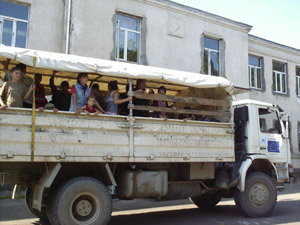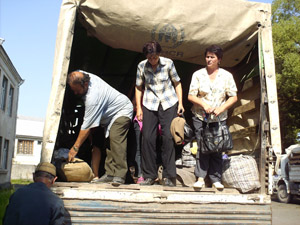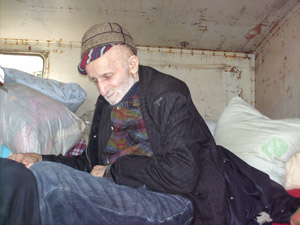Nana Pazhava, Zugdidi
 Nobody has been able or willing to answer the question as yet. In the meantime Georgian authorities and law enforcement bodies are avoiding this most important question. Moreover, not even those who live in the Kodori gorge are speaking opening about the reasons that they fled so soon as the first barrage of Russian fire and the bombing of their villages. However, there are some exceptions, as found with several ethic Svans (a sub group of ethnic Georgians who reside in mountainous region of Svaneti). They are honestly speaking out as why they left homes.
Nobody has been able or willing to answer the question as yet. In the meantime Georgian authorities and law enforcement bodies are avoiding this most important question. Moreover, not even those who live in the Kodori gorge are speaking opening about the reasons that they fled so soon as the first barrage of Russian fire and the bombing of their villages. However, there are some exceptions, as found with several ethic Svans (a sub group of ethnic Georgians who reside in mountainous region of Svaneti). They are honestly speaking out as why they left homes.
In addition, MP Paata Davitaia has several hard questions for the Georgian Defense Minister about the current situation in the gorge. Abkhazian and Russian military forces have since been controlling Upper Abkhazia (Kodori gorge) as of August 12. Georgians living there have abandoned the Kodori Gorge in mass and now 1 600 IDPs have arrived to Zugdidi, administrative center of Samegrelo-Zemo Svaneti region, with the support of UN Peacekeeping Mission and Georgian Ministry of Refugees and Accommodation.
‘I wonder what in fact happened in Kodori Valley; why separatists and Russians have invaded it without any obstacles and why Georgia has at this time lost Kodori?!” MP Paata Davitaia asked at the session of the Georgian legislative body on August 12. The MP added that he had several questions when it came to the Russian invasion of the Kodori Valley for Davit Kezerashvili, the Georgian Minister of Defense. Davitaia now intends to raise these questions during a closed parliamentary session where the minister will make report to the legislative body, which will happen soon after military operations have been completed by the Russian Federation on Georgian territory.
On August 20, in his interview with the Human Rights Center, MP Paata Davitaia stated that people, responsible for the defense of the Kodori Valley and its population, are evidently responsible for the recent situation. He will now demand that a special commission be established to investigate what actually happened and why this last remaining territory of Akbhazia was lost.
 Paata Davitaia: “There were only four attacks on Upper Abkhazia and Georgian armed forces and units of the Georgian Internal Ministry successfully resisted those attacks. It would have been impossible for the invaders to have taken over and occupy the gorge. Separatists would have had to bleed heavily and make a great sacrifice to occupy the gorge, which proved not to be the case.
Paata Davitaia: “There were only four attacks on Upper Abkhazia and Georgian armed forces and units of the Georgian Internal Ministry successfully resisted those attacks. It would have been impossible for the invaders to have taken over and occupy the gorge. Separatists would have had to bleed heavily and make a great sacrifice to occupy the gorge, which proved not to be the case.
In fact, the Kodori Valley surrendered without any resistance whatsoever. I cannot blame anybody at this time, as now is not the appropriate time to be pointing fingers and making any hard recriminations. Regardless, however, I have some serious questions. Why are the very soldiers who were stationed in the defense of Kodori telling that they were ordered to retreat and not to hold their ground?” I also understood that the Georgian President had not given any such order to Georgian forces in Kodori. He was actually furious when he first learned of the total retreat and how the gorge was lost without a fight or a shot being fired in its defense. Moreover, if the soldiers had not received any such an order, and they retreated from the valley for their own safety, and without being legally ordered, then yet another crime has been committed. In this case, it is quite obvious the person that should be held responsible is the person that made the decision to retreat in the first place.”
Paata Davitaia also stated in following up to his initial statement during a parliamentary session that he has since received threatening phone calls and the source of the calls suggested the MP not be making inquires about the militarily rout that took place in Kodori.
Paata Davitaia: “I informed Davit Bakradze, immediately after I received threatening phone calls. Regardless of the fact that I don’t know who actually called me one thing is clear: I am not backing down from making an investigation of what had actually happened in Kodori. I am from that region. I was born in Gulripshi district. Upper Abkhazia had and continues to have strategic importance for Georgia. I am especially sorry for what has happened because did not take-a-stand and put-up-a fight to hold the gorge. For obvious security reasons I cannot share with you the exact number of Georgian troops deployed in Kodori valley, and for most understandable reasons. However, I know for sure that there were enough troops to defend the territory. There were even enough forces to resist long-term attacks. In spite of all this, the question remains, “what happened there?”

On August 18 UN mission evacuated a second wave of IDPs from Chuberi, a village of Upper Abkhazia. Nearly 400 people were sheltered into Zugdidi Public School # 4 and were prepared to leave for Kutaisi, Imereti region. IDPs were collected from various vehicles and boarded yellow Dutch made buses. The UN mission had to transport the IDPs to Kutaisi before nightfall.
There was a wide range of IDPs, representing various ages. Thee stories they told were all basically the same. The common thread of their stories tells how they had to flee their homes I in order to escape Russian bombs. One thing is certain, however, is how locals recalled that the Georgian troops were the first to leave and local citizens escaped without protection and were left on their own.
Beka Gerliani, eighteen years old IDP from Nahare, a village in the valley: “Six families lived in my village and everybody has left. I managed to make run at 2:00 AM. The next morning the Abkhazian soldiers had taken Nahare. We ourselves found shelter in the village of Chuberi.”
Izolda Gerliani, thirty-year-old IDP from Azhara: “The gorge was being bombed but we hoped that they were just trying to frighten us. However, when they started intensive bombing we had no choice but to flee our homes as we wanted to get far away from the pending disaster. It was so heavy that we even lost hope that we would somehow get out alive. We were surprised that they did not bomb our route of escape. We can only guess that they had opened kind of humanitarian corridor for us to safely flee. They did not fire at us as we made our escape. People told that fighting was going on only on the first line. Our Georgian soldiers met us in Chuberi and they tried to rescue us. Then Russians started bombing of Chuberi too and Georgian commander provide help and we were evacuated from Chuberi too.”
Leila Subeliani, twenty-eight-year-old from Chkhalta: “we were attending the funeral of one of our relative when the bombing started. We had just arrived at the cemetery and bombs started falling around us. I only had the clothes on my back and nothing more. I could not manage to go home. My daughter-in-law and my grandchild followed in another vehicle. Bombs were dropping in close proximity. The car was so shaking and we thought it would soon take a direct hit and we would be killed; all this happened on August 9….”
Sharden Gerliani, eighty-year-old man from Gvandari: “My village was bombed. The villages of Gentsvisi and Omarishari were also bombed. We left everything behind and fled for our lives. Here I am with my wife, sisters, daughter-in-law and grandchildren. I was not allowed even to die in at home in peace. Not even God knows what will happen in the future.”
Slibistro Gujejiani, eighty-two-year-old from Omarishari: “My wife, my neighbor-eighty-five-year-old Irodi Kaldani and his son were able to make it out by car. We could hear the bombing and explosions. However, nobody heard the sound of other weapon. We left Omarishari only after we saw our soldiers and HQ running from the valley. Until then we had continue to hope that they would stand and protect us. However, in light of their massive retreat there was no sense to stay there any longer and we ourselves could not resist the enemy without the help of the Georgian army.”



